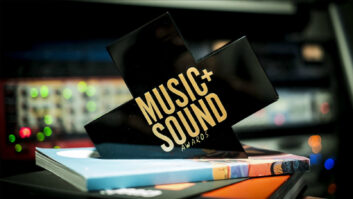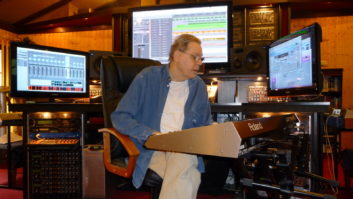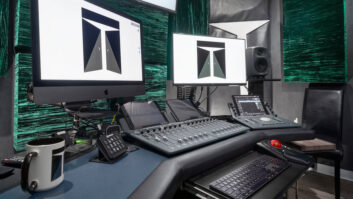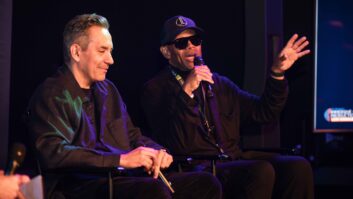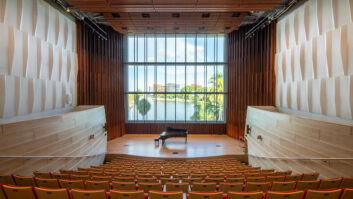
Kasey Chambers’ latest album, Campfire, sees the ARIA Music Award-winning singer/songwriter quite literally going back to her roots where it all began: beside campfires in the barren deserts of Australia. Performed alongside longtime collaborators and “Fireside Disciples” Brandon Dodd, Alan Pigram and her father, Bill Chambers, the album is sparse, authentic and magical. Chambers insisted on a minimalist production approach with almost no overdubs or effects. Pro Sound News caught up with Chambers just prior to her U.S. tour.
On summoning the past
I think this was probably an album I was always going to make. A lot of my childhood was spent living and sleeping around a campfire. When I was a kid, my dad was a professional fox hunter, which is a weird job to have. He still plays guitar in my band and has done forever, but he came from a long line of hunters—people who lived off the land. We lived in our car across the Nullarbor Plain, which is basically a big desert that runs across the middle of Australia. My dad hunted all of our food before we would eat it around the campfire. My brother and I were schooled and also learned to sing around a campfire. Often we would go for weeks without seeing another person. We would hunt through the night and then travel to a new place to set up camp. That was basically how we lived.
On churning out songs
It was the easiest record I’ve ever written—I think because somewhere in my mind I’ve been writing this record since I was a kid. It has been there as a concept for such a long time; it has been brewing the whole time in my subconscious. I don’t really know why I decided to do it now, but it just felt right. Once I started writing, all these songs started flowing out. I have a little home studio where we made the record and it was a very comfortable environment. The production itself was a no-brainer. I really wanted a minimal production and to keep it as raw as I possibly could. It needed to sound like I invited a bunch of people to come and play while we were literally sitting around a campfire.
Related: Music Etc. Stories on Pro Sound News
On nitpicking vocals
I’m quite lucky that when I open my mouth, something comes out that sounds half decent because that’s really about how far I think about it. I am not someone who wants to think about things too much, and to be honest, every so often I’ll work with a producer who really likes to dissect things—“Let’s change the way you sing the third line in the second verse”—and I’m just like, oh man, it’s not going to work! I really just like to go and sing all my vocals all the way through with the band, and I never like overdubbing. I want to make my magic at the same time that everybody is making the magic. This approach does mean that sometimes you have to overlook certain things, like some off notes here or there, or even a wrong lyric. On my last record, I can pick out a couple of places where I’ve sung the wrong lyric. But overall it is really important for me to be making my magic at the same time as the rest of the band.
On microphone choices
I don’t spend a whole lot of time thinking about microphones. Thankfully I have a whole lot of people working around me who know what is best for my voice. I would absolutely imagine that my voice is not an easy voice to record because it is so unique—which is a very nice way to say it. Most people just say it’s high, whiny and freaky. In fact, my family members are all kind of sick of my voice by now! About three years ago, I actually had nodules on my vocal cords. I had them removed, so now my voice has a lot more power and volume, and I’m able to put a bit more weight behind it. My album before Campfire, Dragonfly, had a song on it called “Ain’t No Little Girl,” which is one of my favorite songs to sing. I wrote that before I had the nodules, but I never would have been able to sing it or record it in any way before the operation.
On working with dad
My dad was always going to be involved on this record as much as on any other record I’ve ever made. He’s on all my records and is a big part of my sound, particularly on my last two albums. On this latest tour and album, he’s an even bigger part of it because I tell lots of stories about our childhood, where songs came from and what it was like growing up around the campfire. We’ve sort of created a sound together over the years and we like working together when we go out on the road. I kind of feel lost when he’s not there. A really good friend of mine, Alan Pigram, was also a big part of this record. We wrote some of the songs together and he also does the traditional Aboriginal spoken word in “The Campfire Song.” He is from an Aboriginal tribe in Broome, in Western Australia, called the Yawuru tribe. He brought a special flavor to the record that is something I haven’t had on my albums before.
Jacques Sonyieux is a devout explorer of recording studios and the artists who occasionally inhabit them.
